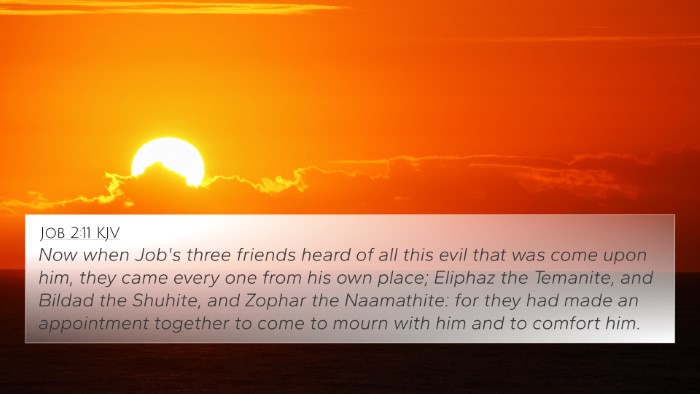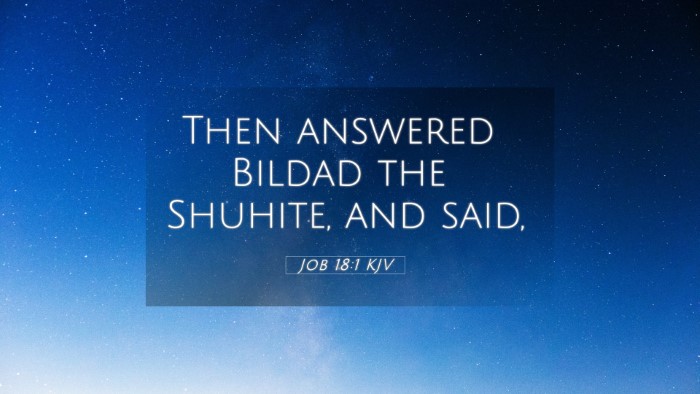Old Testament
Genesis Exodus Leviticus Numbers Deuteronomy Joshua Judges Ruth 1 Samuel 2 Samuel 1 Kings 2 Kings 1 Chronicles 2 Chronicles Ezra Nehemiah Esther Job Psalms Proverbs Ecclesiastes Song of Solomon Isaiah Jeremiah Lamentations Ezekiel Daniel Hosea Joel Amos Obadiah Jonah Micah Nahum Habakkuk Zephaniah Haggai Zechariah MalachiJob 18:1 Similar Verses
Job 18:1 Cross References
Then answered Bildad the Shuhite, and said,
Uncover the Rich Themes and Topics of This Bible Verse
Listed below are the Bible themes associated with Job 18:1. We invite you to explore each theme to gain deeper insights into the Scriptures.
Job 18:1 Cross Reference Verses
This section features a detailed cross-reference designed to enrich your understanding of the Scriptures. Below, you will find carefully selected verses that echo the themes and teachings related to Job 18:1 KJV. Click on any image to explore detailed analyses of related Bible verses and uncover deeper theological insights.

Job 2:11 (KJV) »
Now when Job's three friends heard of all this evil that was come upon him, they came every one from his own place; Eliphaz the Temanite, and Bildad the Shuhite, and Zophar the Naamathite: for they had made an appointment together to come to mourn with him and to comfort him.

Job 42:7 (KJV) »
And it was so, that after the LORD had spoken these words unto Job, the LORD said to Eliphaz the Temanite, My wrath is kindled against thee, and against thy two friends: for ye have not spoken of me the thing that is right, as my servant Job hath.
Job 18:1 Verse Analysis and Similar Verses
Understanding Job 18:1
Job 18:1: “Then answered Bildad the Shuhite, and said,”
The verse Job 18:1 marks the beginning of Bildad the Shuhite’s second speech in the dialogue of Job. This speech occurs after Job has lamented his suffering and questioned the justice of his plight. Bildad, one of Job's friends, approaches Job's suffering with a traditional view of divine justice, attempting to provide an explanation through his understanding of God’s ways.
Commentary Insights
- Matthew Henry: He highlights that Bildad responds to Job with a tone of rebuke rather than comfort. His speech reflects the traditional belief that suffering is a consequence of sin. Henry points out that Bildad's approach lacks empathy and fails to recognize the complexity of Job's situation.
- Albert Barnes: Barnes emphasizes that Bildad speaks with a certainty about God’s justice, arguing that the wicked receive punishment. His assertion suggests deeper themes of retribution and the seeming disconnect between divine justice and Job's experience. Barnes notes that this perspective simply deepens Job's anguish.
- Adam Clarke: Clarke comments on the character of Bildad as one who is zealous for the honor of God, but his zeal leads him to be harsh and judgmental. He stresses that such discussions often ignore the emotional and spiritual struggles of the one suffering, which is crucial to a proper understanding of their grief.
Thematic Connections
Job 18:1 can be cross-referenced with various other biblical texts that illustrate themes of suffering, divine justice, and human response to adversity. Some notable verse connections include:
- Job 4:7-8: “Remember, I pray thee, who ever perished, being innocent? Or where were the righteous cut off?” – This reinforces the belief that suffering is linked to personal sin.
- Job 10:2-3: Job’s own plea questioning God’s justice in light of his suffering.
- Psalms 37:28: “For the Lord loves justice, and does not forsake His saints; they are preserved forever.” – A positive affirmation of divine justice contrasting Bildad’s harsh view.
- Proverbs 11:21: “Though they join forces, the wicked will not go unpunished; but the posterity of the righteous will be delivered.” – Reflecting a similar theme of retribution.
- Lamentations 3:33: “For He does not afflict willingly nor grieve the children of men.” – A verse emphasizing God's unwillingness to cause suffering without purpose.
- Matthew 5:45: “For He makes His sun rise on the evil and on the good...” – A reminder of God’s grace that extends beyond human understanding of justice.
- James 1:12: “Blessed is the man who endures temptation; for when he has been approved, he will receive the crown of life...” – A New Testament perspective on enduring suffering with faith.
Application and Reflection
The dialogue between Job and his friends, beginning with Bildad's response, reveals significant insights into the nature of suffering, the challenge of understanding God’s justice, and the support needed during trials. It encourages readers to consider how they respond to those in pain and the dangers of simplistic theological answers to complex human experiences.
Conclusion
Job 18:1 serves as a striking illustration of the challenges in engaging with suffering and the complexities within human discussions about divine justice. Reflecting on this verse alongside other biblical passages encourages a deeper understanding of God’s mysteries and the compassionate approach we ought to take toward those in distress.
Keywords for Further Study
- Primary Keywords: Bible verse cross-references, connections between Bible verses.
- Secondary Keywords: Tools for Bible cross-referencing, Bible concordance.
- Long-Tail Keywords: How to find cross-references in the Bible, Bible verses related to specific themes.
- User Intent Keywords: What verses are related to Job 18:1, how do Job 18:1 and Job 4:7 connect.




